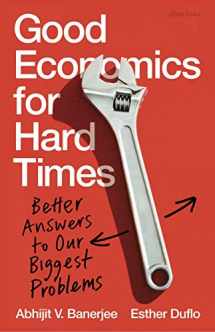
Good Economics, Bad Economics
Book details
Summary
Description
Two prize-winning economists show how economics, when done right, can help us solve the thorniest social and political problems of our day
The experience of the last decade has not been kind to the image of economists: asleep at the wheel (perhaps with the foot on the gas pedal) in the run-up to the great recession, squabbling about how to get out of it, tone-deaf in discussions of the plight of Greece or the Euro area; they seem to have lost the ability to provide reliable guidance on the great problems of the day.
In this ambitious, provocative book Abhijit V. Banerjee and Esther Duflo show how traditional western-centric thinking has failed to explain what is happening to people in a newly globalized world: in short Good Economics has been done badly. This precise but accessible book covers many of the most essential issues of our day--including migration, unemployment, growth, free trade, political polarization, and welfare. Banerjee and Duflo will confound and clarify the presumptions of our times, such as:
Why migration doesn't follow the law of supply and demand
Why trade liberalization can drive unemployment up and wages down
Why macroeconomists like to bend the data to fit the model
Why nobody can really explain why and when growth happens
Why economists' assumption that people don't change their minds has made has made polarization worse
Why quite often it doesn't take a village, especially if the villagers aren't that nice
In doing so, they seek to reclaim this essential terrain, and to offer readers an economist's view of the great issues of the day--one that is candid about the complexities, the zones of ignorance, and the areas of genuine disagreement.


We would LOVE it if you could help us and other readers by reviewing the book
Book review



